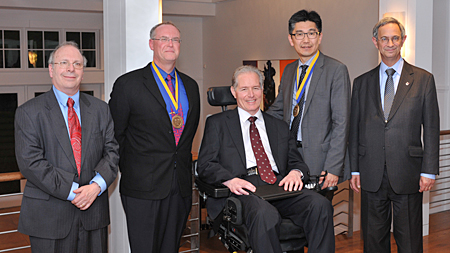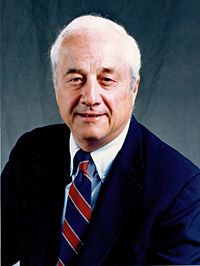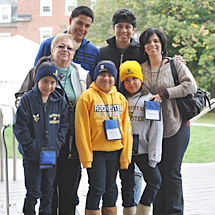Judy Gift Establishes Center for Applied Research at Eastman
The Eastman School of Music’s Institute for Music Leadership (IML) provides aspiring music professionals with the broad education, specialized skills and diversified experiences to be the next generation of musical and cultural leaders. Noted philanthropist Paul R. Judy has spurred the IML’s evolution with a $1 million commitment to establish the Paul R. Judy Center for Applied Research at Eastman.
“Musicians face many challenges after graduation, not the least of which is finding a sustainable way to practice their art,” said Douglas Lowry, Joan and Martin Messinger Dean of the Eastman School of Music. “Mr. Judy’s generous gift will help put Eastman and the IML on the cutting edge of providing young musicians with the tools they need to create their own performance opportunities and become self-sustaining as advocates for the music they love.”
The founding of the Center comes at a time of great upheaval in our concert-music culture. Many of America’s orchestras, faced with the long-term challenges of aging audiences, financial pressures, and competition from other cultural forms, have been cutting positions or going out of business entirely. As a new component of the IML, the Center will be devoted to increasing the understanding and stimulating the development of innovative ensemble models that can be successful in the changing music world.
“I am greatly concerned about the news of orchestra bankruptcies and financial difficulties,” said Judy, former board chair of the Chicago Symphony Orchestra. “I see great hope in the entrepreneurial spirit of the musicians who are taking it upon themselves to energize our culture with their own new groups, and I am pleased to be able to contribute to their continued growth through this gift to Eastman.”
Eastman scholars at the Paul R. Judy Center will engage in discussion and research on alternative ensembles, their business models, and their impact on contemporary culture. In addition, the Center will sponsor a biennial festival and conference for scholars, orchestra managers, ensemble administrators, music school leaders, and students that will offer discussions, presentations, and performances. The inaugural events are scheduled for early 2015.
Paul Judy graduated cum laude with a bachelor’s degree from Harvard University in 1953, and he served as an officer in the U.S. Marine Corps before earning his M.B.A. with high distinction from Harvard Business School in 1957. He is chairman of the Chicago Philharmonic Society, life trustee of the Chicago Symphony Orchestra (CSO), and founder of Eastman School of Music’s Polyphonic.org, an orchestra musician forum and its online resource center.
Judy has been a vital member of the Eastman School of Music National Council and a key advisor to the Dean on the School’s entrepreneurship initiatives, an Eastman priority for its portion of The Meliora Challenge: The Campaign for the University of Rochester. In 2012, Judy’s leadership, advocacy, and generosity earned him the Eastman School of Music Dean’s Medal.
To learn more about the Paul R. Judy Center, click here.
Values and Action

It doesn’t feel like it was that long ago that I was applauding efforts that made 2012 a year of record-breaking performance. Perhaps it is because now, in 2013, we have once again exceeded our University year-end goals in several key areas.
This year, we set a goal of $110 million in “new commitments” (new funds raised), and I’m proud to report that we finished just under $114.5 million. Our “total cash” eclipsed the University’s second largest cash year (2012, $92.9 million) with a performance of ~$96 million. And thanks in large part to the impressive growth of the George Eastman Circle, we have exceeded our Annual Fund goals for the eighth consecutive year by raising more than $13.25 million—a year-over-year growth rate of approximately 7.8%.
In sum, when we closed the books on 2013, our Campaign stood at $944,994,583, which is still ahead of plan. Thank you for your leadership, your generosity, and your unyielding support of the initiatives that are sustaining and driving our progress. We continue to build a philanthropic and volunteer culture that great private universities treasure. Together we make a winning team!
As we have already begun working toward our goals for 2014, I want to share a page from the book of Herman LeRoy Fairchild. Fairchild was an internationally known geologist and University professor of geology and natural history from 1888 until his retirement in 1920. While he is probably best known for his achievements in these areas, he was fond of a motto that would serve any endeavor well: “pas à pas, on va bien loin,” which is French for “step by step, one goes far.”
If each of us approaches every day with a new goal in mind, by the end of the year, we will have achieved a great deal. Step by step, there is no limit to what we can accomplish!
Meliora!
James D. Thompson
Senior Vice President
Chief Advancement Officer
Hayes Installed as the Inaugural Koide Professor
 From left: Mark Taubman, M.D., Jeffrey Hayes, Ph.D., Bradford Berk ’81M (MD), ’81M (PhD), Shohei Koide, Ph.D., President Joel Seligman
From left: Mark Taubman, M.D., Jeffrey Hayes, Ph.D., Bradford Berk ’81M (MD), ’81M (PhD), Shohei Koide, Ph.D., President Joel Seligman
Imagine if medicine could be customized based on a person’s biochemical makeup. This is an emerging reality that requires a complete understanding of how genes are regulated and the conditions in which they are active and quiet. The research of Jeffrey Hayes, Ph.D., acting chair of the Department of Biochemistry and Biophysics in the School of Medicine and Dentistry, seeks that understanding.
Hayes’ stunning research is just one of the reasons he was chosen to be the inaugural Shohei Koide Professor in Biochemistry and Biophysics. The installation ceremony was held at the University’s Witmer House on May 28. Family members and other special guests gathered to recognize Hayes as an outstanding scientist, educator, and administrator and to honor a fellow leader in biochemistry and biophysics, former University professor Shohei Koide, Ph.D., whose patents generated the funds that allowed the University to create this professorship in his name.
“Dr. Koide’s innovations in protein-capture technology provide researchers with critical molecular tools that impact virtually all areas of molecular biomedical science, medical diagnosis, and drug development,” said President Joel Seligman. “The creation of a professorship recognizes his stunning achievements.”
A leader in the fields of protein design and engineering, Koide was a faculty member in the Department of Biochemistry and Biophysics from 1995 to 2002. During his tenure, he developed technology, which has been widely adopted in industry and academia, to create antibody-like proteins that can specifically bind medically relevant targets. Koide has been a professor of biochemistry and molecular biology at the University of Chicago since 2002.
Hayes has also made impressive contributions. A faculty member since 1994, Hayes’ research focuses on DNA structure, chromatin, and DNA repair. He has been a featured speaker at more than 75 seminars and meetings held in the United States, Canada, Europe, and Japan. He has also served on the editorial boards of Chemtracts: Biochemistry and Molecular Biology, The Journal of Biological Chemistry, and Biochemistry and has authored or coauthored more than 100 scholarly articles.
“An endowed professorship is a coveted and defining award that helps the University attract and retain eminent professors and provide them with the freedom to pursue projects that hold the most potential for medical breakthroughs,” said Mark Taubman, dean of the School of Medicine and Dentistry and University vice president for Health Sciences. “These positions were made for faculty members like Dr. Hayes.”
Meliora Weekend
Save the Dates:
October 10-13, 2013
Mark the calendar—the University celebrates its 13th Meliora Weekend this year, featuring a keynote address from former Secretary of Defense Robert Gates and a performance by comedian Demetri Martin from The Daily Show.
George Eastman Circle members can also look forward to a special address by Wall Street Journal columnist Peggy Noonan.
For more information about this year’s events, please visit www.rochester.edu/melioraweekend.

